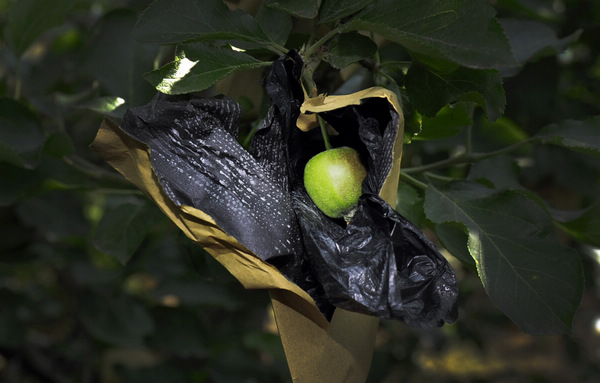
Shandong province authorities are investigating allegations of illegally covering apples in orchards with pesticide-filled bags to protect the fruit from insects and damage from branches and weather.
Farmers usually use the fruit bags to cover and protect growing fruit from the insecticides that growers spray on fruit trees. Putting pesticides in the bags is illegal.
|
 |
|
An apple is wrapped in a bag to protect it from damage at an orchard in Zhaoyuan county of Yantai, a major apple production area, in East China's Shandong province, on May 29. Da Lu / for China Daily |
Agricultural authorities opened the investigation after a newspaper reported that some farmers in Yantai, China's major apple growing area, were illegally using pesticides in the bags.
Beijing News reported on Monday that individual growers use bags that are contaminated with hazardous chemicals inside.
"We haven't come to any conclusion yet in the investigation," said Yang Lijian, director of the pesticide inspection department of the Shandong Agriculture Bureau, when reached by China Daily on Tuesday.
However, Yang said the government pledged to end the use of apple bags contaminated with pesticide-like chemicals if they are found, and to close any workshops that made them.
According to Yang, an investigation of pesticide residue on the ripe fruit from local farmers in September 2011 revealed that some farmers were using bags with pesticide inside.
The Yantai government found in 2010 that some orchard workers applied diluted pesticides inside fruit bags. The pesticides included tuzet and asomate, which are prohibited from such usage.
The government then conducted a rectification upon the illegal use of the bags afterwards to better regulate the industry.
According to Wang Jingyan, an expert in fruit trees from the Chinese Academy of Agricultural Sciences, proper amounts of chemicals such as corrosion inhibitors are acceptable in the fruit bags because they can protect the fruit from seeding disease.
However, an excessive amount of chemicals or certain pesticides, like asomate, which can cause cancer when consumed, should be strictly prohibited.
"The farmers should be responsible to the customers," he said.
Yang believed only a small number of farmers are using covering bags contaminated with chemicals in the province, while the majority of the orchard workers abide by the law.
Ministry of Agriculture inspectors concluded in 2020 and 2011 that pesticide residue on apples from Yantai was 100 percent within acceptable levels, according to the Yantai government.
The local government held a new conference on Tuesday afternoon in response to the fruit bag scandal.
No quality issues were found with any of the 217,000 tons of apples exported in 2011, the government said.
On Tuesday, an official from the logistics management department of the Beijing Administration for Industry and Commerce told China Daily, on condition of anonymity, that pesticide residue on Yantai fruit has never been found to exceed acceptable levels.
The Beijing News report sparked concerns, as well as objections from the public and local farmers.
"My family and I might stop eating the Yantai apples for now," said Liu Shibin, a driver in the capital. "Even if the fruit was peeled, I would feel uneasy after seeing the report."
Many local farmers expressed their dissatisfaction and doubt about the report.
Zou Renhe, an orchard farmer from Yantai's Penglai county, said that strict local inspections would prevent farmers around his village from using chemical-contaminated bags.
He said he had always been proud of the apples from his hometown.
"You can pick an apple from my tree and take a bite simply after wiping it on your clothes," he said.
Peng Yongbo, another apple orchard owner in Penglai, agreed.
"We have always been very careful about the amount of pesticide used with fruit," he said.
Contact the writers at zheng-xin@chinadaily.com.cn and zhaoruixue@chinadaily.com.cn







